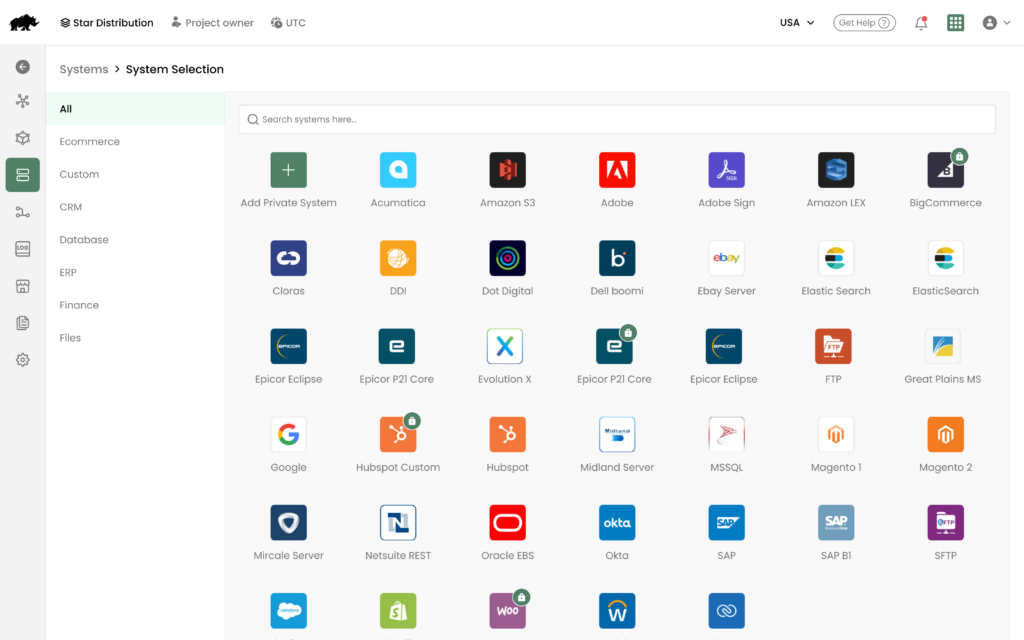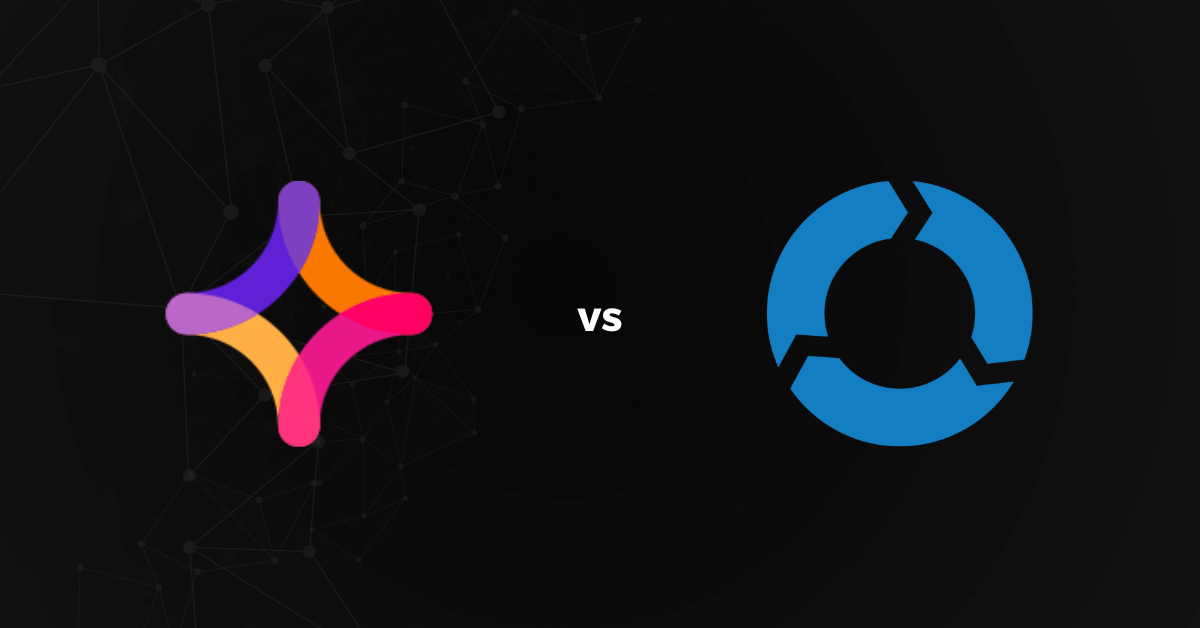With the SAP Business One and Salesforce integration, you can make data more accessible, improve budget forecasting, enhance financial analysis, and manage suppliers more effectively. Say goodbye to tedious tasks and hello to smoother workflows and automated returns on investment (ROI). It’s time to simplify your processes and make your ERP work smarter for you!
Methods of SAP Business One Salesforce Integration
The following are the two widely preferred integration methods:
iPaaS Integration
When it comes to SAP Business One Salesforce Integration, iPaaS integration is the best choice. iPaaS solutions typically provide pre-built adapters for SAP, eliminating the need to develop them from scratch. These platforms handle critical aspects such as connection handling, authentication, and security.
Commonly used iPaaS solutions for Salesforce-SAP integration include DCKAP Integrator, MuleSoft, Jitterbit, Dell Boomi, and more. These solutions offer varying degrees of support and flexibility for integrating SAP Business One into Salesforce.
| DCKAP Integrator is a top option for distributors looking to integrate their SAP Business One and Salesforce tools. |
Custom Integration
This involves building a direct integration without relying on an integration platform. This approach utilizes Salesforce APIs like REST, SOAP, Streaming, and Web Service callouts, as well as Salesforce Connect.
While this method doesn’t require additional licenses or subscriptions beyond core Salesforce and SAP licenses, it demands significant implementation effort and carries a high project risk.
Additionally, direct integration from scratch may be limited as Salesforce cannot integrate directly with SAP standards, impacting integration options.
Also read: SAP Business One ERP – A Comprehensive Overview
Top Tools to Integrate SAP Business One and Salesforce
Here are the most popular SAP Business One Salesforce integration tools:
1. DCKAP Integrator
DCKAP Integrator is an enterprise integration platform designed to manage data flow among various applications such as ERP, CRM, ecommerce platforms, EDI, databases, PIM, and marketing tools.
Key Features and Benefits
- Utilizes drag-and-drop functionality for quick project implementation.
- Provides pre-built connectors, flow designers, and advanced data mapping for non-technical users.
- Logs all transactions for complete visibility. It offers manual sync, dynamic sync, and batch sync features.
- Supports custom APIs for integrating multiple systems.
- Cost-effective and affordable, specifically catering to distribution needs.
Pricing
DCKAP Integrator offers transparent and flexible pricing plans. No hidden charges post-implementation or renewals. You can choose from Standard, Premium, and Enterprise plans based on features, integration, number of users, and customer support.

2. Jitterbit
Jitterbit is an agile solution that automates the integration, connecting sales data, product mix, credit, and more between SAP and Salesforce. This platform helps businesses speed up and improve decision-making. It does this by bringing together and using data from different places.
The platform has a smart tool to organize data and other tools to clean up and change it. This makes it easier for businesses to manage and use their data more efficiently.
Features and Benefits
- The platform allows customers to be operational with their first integration in less than 30 days, ensuring a swift delivery of customer experiences.
- Jitterbit simplifies integration with dedicated Salesforce Connectors and SAP Connectors. Integration Recipes are also available for SAP and Salesforce use cases, making the integration process straightforward and user-friendly.
- Jitterbit emphasizes customer trust, offering expert support for integrations, whether they are complex or straightforward.
Pricing
Jitterbit operates primarily with three tiers: Standard, Professional, and Enterprise. Custom pricing options are available based on specific requirements, and the company also provides Enterprise License Agreements (ELA) for supporting broader, enterprise-wide deployments. Prospective clients are encouraged to reach out to Jitterbit directly to initiate discussions and tailor the pricing to their individual needs.
3. Boomi
Boomi, as a leading iPaaS provider, offers thousands of pre-built connectors for seamless integration between SAP and Salesforce, requiring minimal technical expertise for quick implementation.
Features and Benefits
- Boomi facilitates building, enriching, and synchronizing disparate data across the enterprise with master data management services.
- Boomi AtomSphere Platform allows users to design, secure, and scale APIs, manage policy and data access, and publish any endpoint as an API.
- Dell Boomi AtomSphere Platform provides enterprise-grade security and complies with various industry standards, ensuring data security and regulatory compliance.
Pricing
Boomi offers flexible pricing structures tailored for SMBs and Enterprise-grade iPaaS, with plans ranging from Professional to Enterprise Plus, along with a 30-day free trial period.
4. Celigo
Celigo facilitates integration between SAP Business One and Salesforce, empowering sales teams to customize outreach for more effective cross-selling and upselling. It synchronizes deal and customer information, making customer purchase history easily accessible.
Features and Benefits
- Supports various integrations, including application, B2B, and event-driven integrations.
- Provides pre-built connectors for seamless integration with popular business applications.
- Utilizes advanced AI to ensure consistent error messages for all APIs.
- Automatically resolves repetitive errors to save users time and effort.
Pricing
Celigo Offers package pricing based on the number of endpoints and integration flows required. Mainly they have four different plans, starting with a Freemium Plan allowing one integration flow for free. Plans range from $600 to $1500 per month, with included flows ranging from 16 to 100.
Also read: SAP Business One Integration Using DCKAP Integrator: Your Quick Start Guide
Why Integrate SAP Business One And Salesforce?
SAP Business One Salesforce Integration holds significant importance for businesses. It facilitates a seamless exchange of data between customer-facing and internal operations, leading to increased operational efficiency and heightened customer satisfaction.
Here are some key benefits of integrating Salesforce and SAP:
Streamlined Operations
Integration between Salesforce and SAP transforms business operations by automating processes. For instance, sales data originating from Salesforce can be automatically updated in SAP, eliminating manual data entry and minimizing the potential for errors. This streamlining of operations enhances overall efficiency.
Reduced Overheads
Automation of tasks and workflows reduces the need for extensive manual intervention, resulting in decreased overhead costs. With automated processes, teams spend less time on scheduling and follow-ups, enabling quicker and more informed decision-making.
Enhanced Customer Experience
The integration empowers businesses to offer a more personalized and efficient customer experience. By utilizing data from Salesforce within SAP, businesses can tailor their approach to meet customer needs more effectively. This tailored service not only meets but exceeds customer expectations.
Data-Driven Decision Making
An unified SAP Business One Salesforce Integration facilitates more effective data analytics and reporting. By pulling information from both systems into a central dashboard, businesses gain access to insightful analytics. This, in turn, supports data-driven decision-making processes, allowing organizations to make informed and strategic choices based on comprehensive data sets.
By leveraging the strengths of both platforms, organizations can optimize their processes, improve customer interactions, and make informed decisions based on a holistic view of their data.
Also read: SAP ERP Integration Explained [+Top 5 Use Cases]
Best Practices to Choose the Right Integration Vendor
Selecting the right integration vendor for SAP Business One Salesforce Integration involves considering a few best practices:
Assess Your Needs: Understand your specific integration requirements, considering the data and processes you need to connect between SAP Business One and Salesforce.
Vendor Experience: Look for a vendor with experience in SAP Business One Salesforce Integration. An experienced vendor is more likely to provide reliable solutions.
Ease of Use: Choose a vendor offering a user-friendly integration platform. The process should be straightforward for your team, regardless of technical expertise.
Scalability: Ensure the chosen vendor’s solution can scale with your business growth. It should accommodate future needs and increased data volumes.
Customer Support: Assess the level of customer support provided. A vendor with responsive and knowledgeable support can be crucial for a smooth integration experience.
Security Measures: Prioritize security features. The integration should adhere to data protection standards and ensure the secure transfer of information between SAP Business One and Salesforce.
Cost Considerations: Understand the pricing structure, including any hidden costs. Choose a vendor that aligns with your budget and offers a transparent pricing model.
Client References: Seek client references or case studies from the vendor. Learning about successful integrations they’ve handled can provide insights into their capabilities.
Best Integration Solution For Distributors – DCKAP Integrator
DCKAP Integrator is undoubtedly a top choice for distributors because it understands the complexities and challenges of the distribution business and made specifically to solve that. Here’s how it can help:
- Boasts a versatile and user-friendly interface with high compatibility.
- Ensures a single source of truth by centralizing data.
- Allows complete control over custom field mapping.
- Implementation time of 4 to 6 weeks with robust customer support.
- Alert mechanisms to notify of any error.
FAQs
What is SAP Business One Salesforce Integration?
Salesforce and SAP Business One integration refers to the process of connecting and synchronizing data between Salesforce CRM (Customer Relationship Management) and SAP Business One ERP (Enterprise Resource Planning) systems. This integration allows seamless communication and data sharing between the two platforms, enhancing business processes and streamlining operations.
Why integrate Salesforce and SAP Business One?
Integrating Salesforce and SAP Business One offers several benefits, including:
- Streamlined data flow: Ensures consistent and accurate data across sales, finance, and customer service departments.
- Improved efficiency: Reduces manual data entry and eliminates duplication of effort.
- Enhanced decision-making: Provides a unified view of customer interactions and business processes.
- Better customer experience: Enables personalized and responsive service delivery.
How does ERP-CRM integration help in business processes?
Integrating ERP (Enterprise Resource Planning) and CRM (Customer Relationship Management) systems streamlines business processes by connecting essential functions. This integration ensures that sales, finance, customer service, and other departments can access and share real-time data. It facilitates a more holistic view of customer interactions, enhances decision-making, and improves overall operational efficiency. For example, sales teams can access details like financial data, customer histories, and inventory levels directly within the CRM system, leading to better-informed sales strategies and improved customer satisfaction.
What data can be integrated through Salesforce and SAP Business One integration?
The integration between Salesforce and SAP Business One allows the seamless synchronization of various data types. Commonly integrated data includes customer data, Sales Orders, product prices, and Invoices.
How long does the integration implementation take?
The implementation time can vary based on specific requirements, but generally, Salesforce and SAP Business One integration projects can be completed within a few weeks to a couple of months. The timeline depends on factors such as customization needs, data volume, and complexity of business processes.
Contents




